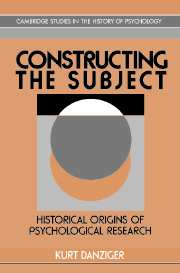Book contents
- Frontmatter
- Contents
- Preface
- 1 Introduction
- 2 Historical roots of the psychological laboratory
- 3 Divergence of investigative practice: The repudiation of Wundt
- 4 The social structure of psychological experimentation
- 5 The triumph of the aggregate
- 6 Identifying the subject in psychological research
- 7 Marketable methods
- 8 Investigative practice as a professional project
- 9 From quantification to methodolatry
- 10 Investigating persons
- 11 The social construction of psychological knowledge
- Appendix
- Notes
- Index
5 - The triumph of the aggregate
Published online by Cambridge University Press: 18 September 2009
- Frontmatter
- Contents
- Preface
- 1 Introduction
- 2 Historical roots of the psychological laboratory
- 3 Divergence of investigative practice: The repudiation of Wundt
- 4 The social structure of psychological experimentation
- 5 The triumph of the aggregate
- 6 Identifying the subject in psychological research
- 7 Marketable methods
- 8 Investigative practice as a professional project
- 9 From quantification to methodolatry
- 10 Investigating persons
- 11 The social construction of psychological knowledge
- Appendix
- Notes
- Index
Summary
Knowledge claims and attributions
Modern psychology may have started out with at least three different types of investigative practice, but, as we have seen, one of these hardly survived the first few decades in the history of the discipline. Among the other two, it was the Galtonian type that was to achieve a dominant position during the first half of the twentieth century. In the following chapters we will have to analyze various aspects of this complex historical development. Our analysis will draw heavily on the information contained in the psychological journals that now provide the major vehicle for the establishment of psychological knowledge claims. Twentieth-century psychology is a system of “public knowledge,” and the major disciplinary journals constitute the crucial link in the transformation of the local knowledge produced in research settings into truly public knowledge.
This transformation involves the preparation of a research report that meets the criteria and conventions that prevail within the discipline or research area. Ostensibly, the research article communicates certain “findings” held to represent knowledge by the conventions of a particular community. In fact, the contents of the article only represent a knowledge claim, which may or may not be accepted by its intended audience. To convince this audience, the authors must submit to its conventions. For instance, they must adopt a certain literary style, relate the contents of the article to known concerns and interests of its possible audience, demonstrate the conformity of their methods to prevailing norms, and so on.
- Type
- Chapter
- Information
- Constructing the SubjectHistorical Origins of Psychological Research, pp. 68 - 87Publisher: Cambridge University PressPrint publication year: 1990



